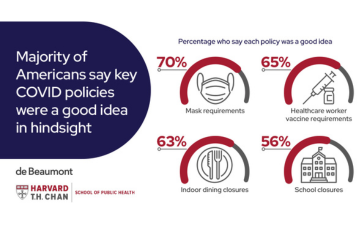More than half of the nation’s 40 largest cities are trailing when it comes to the policies that improve the health and well-being of their residents, according to the CityHealth initiative’s first-ever city ratings. A project of the de Beaumont Foundation, the assessment is the culmination of a two-year analysis into how cities fare across nine policies that help residents lead healthier lives and communities thrive.
CityHealth awarded cities gold, silver, bronze or no medal based on the number and strength of their policies in nine areas, as well as overall. New York, Chicago, Los Angeles, Boston and Washington, D.C. were the only cities to receive an overall gold medal; five cities received silver; nine received bronze; and 21 did not have enough strong policies to warrant a medal.
“We want every person, in every city, to live the healthiest possible life and we’ve identified ways that cities can make significant improvements,” said Ed Hunter, president and CEO of the de Beaumont Foundation, the founder of the CityHealth initiative. “Good health extends into every aspect of our lives – from employment policies that support working families to early education to affordable housing, safe streets, and neighborhoods.”
CityHealth policies include recommendations for issues such as affordable housing, transportation, public safety, and early education; each recommendation is backed by evidence, supported by qualified experts, and has a track record of bipartisan support.
“Policy is a powerful lever for leaders looking to make a difference in people’s well-being and make their cities great places to live. We congratulate cities that have seized opportunities to lift all neighborhoods, and look forward to working together to enhance policy areas like paid sick days and public safety by regulating the density of alcohol retail outlets,” said Dr. Shelley Hearne, CityHealth’s principal investigator.
“When city leaders – and in Los Angeles that includes county leaders – focus on policies that improve people’s well-being and quality of life, their communities and economies flourish. All around, it’s a win-win,” said Dr. Jonathan Fielding, professor-in-residence at UCLA. “I saw that firsthand during my time as director of the Los Angeles County Department of Public Health, and it’s why I’ve been involved in advising the de Beaumont Foundation’s CityHealth project from the start. I’m delighted to see Los Angeles recognized as one of the five leading cities in the U.S. that is advancing policies to improve people’s quality of life.”
Cities still have ample opportunities to boost residents’ well-being and build stronger communities. With 40 cities and nine polices, CityHealth had a total of 360 potential policy medals to award. Cities earned 171 of these, and every city received at least one. However, more than half the total policy medals were left unearned.
CityHealth will update its ratings again in three years. In the meantime, new resources from the de Beaumont Foundation will provide technical assistance and support to cities as they advance these policies, with the goal of creating healthier lives, stronger communities, and cities people are proud to call home.
To see how cities rate on each of the nine policies, and overall, visit the CityHealth website.
– – –
Overall Gold Medalists (five or more gold medals across each of the nine policies)
Boston, MA
Chicago, IL
Los Angeles, CA
New York, NY
Washington, DC
Overall Silver Medalists (five or more gold or silver medals across each of the nine policies)
Philadelphia, PA
Sacramento, CA
San Diego, CA
San Francisco, CA
San Jose, CA
Overall Bronze Medalists (four or more gold, silver or bronze medals across each of the nine policies)
Atlanta, GA
Baltimore, MD
Charlotte, NC
Denver, CO
Fresno, CA
Houston, TX
Kansas City, MO
Long Beach, CA
Seattle, WA
No Medal (no overall medals were awarded for cities receiving three or less medals across each of the nine policies)
Albuquerque, NM
Austin, TX
Columbus, OH
Dallas, TX
Detroit, MI
El Paso, TX
Fort Worth, TX
Indianapolis, IN
Jacksonville, FL
Las Vegas, NV
Louisville, KY
Memphis, TN
Mesa, AZ
Milwaukee, WI
Nashville, TN
Oklahoma City, OK
Phoenix, AZ
Portland, OR
San Antonio, TX
Tucson, AZ
Virginia Beach, VA
The nine policies include:
Paid Sick Days
No one should have to choose between caring for themselves or sick family members and paying their bills. Paid sick policies reduce the spread of contagious illnesses, increase employment and income stability, and save cities money in health care costs.
Universal, High-Quality Pre-Kindergarten
Done right, all children benefit from early childhood education, regardless of family income or zip code. Access to high-quality pre-k benefits children and their communities throughout the course of their entire lives – it raises children’s lifetime wages, high-school graduation rates and years of education completed, reduces crime and teen pregnancy, and improves health outcomes.
Affordable Housing and Inclusionary Zoning
Stable, safe, healthy, and affordable living conditions benefit everyone, and are crucial to children’s lifelong achievement. Affordable housing promotes diverse, inclusive neighborhoods and positive mental health, reduces crowding and exposure to environmental hazards, and frees up resources to pay for health care and healthy food.
Complete Streets
We all need safe, convenient ways to get around our communities – whether that’s getting to work, getting your families to school, or enjoying recreation and active living. Complete streets policies harmonize safety with the needs of all forms of transportation from walking, to biking, driving or taking the bus. These policies expand economic growth, improve individuals’ health, and can save lives.
Alcohol Sales Control
We all want our neighborhoods to be safe places to live, work, and raise families. Neighborhoods with high concentrations of alcohol outlets are linked to more drinking and higher rates of violence and driving under the influence. Policies that address a high density of alcohol outlets can reduce crime, increase safety and reduce spending on health care and criminal justice costs.
Tobacco 21
Preventing tobacco use has already had a dramatic effect on our country yet smoking tobacco remains the single most preventable cause of death and disease. Policies that raise the minimum legal age for the sale of tobacco products to 21 reduce the number of young people using these products which greatly reduces their risk for addiction and disease.
Clean Indoor Air
Everyone should have access to clean air. These policies protect non-smokers from the harmful effects of tobacco – which is the largest preventable cause of death – and they reduce smokers’ consumption of tobacco at the same time.
Food Safety and Restaurant Inspection Ratings
Nearly half of the money we spend on food is in restaurants. Consumers should be empowered to make informed decisions before entering a restaurant to reduce their risk for foodborne illness. Policies that require food establishments to publicly post food safety inspection grades empower consumers, reduce foodborne illness and save on health care costs.
Healthy Food Procurement
Everyone benefits from access to high quality, affordable food options. Our health is heavily influenced by what we eat, and what we eat is heavily influenced by the quality, variety, and cost of food served in our workplaces, schools, and other community institutions. Policies that ensure food sold and served in city buildings meets basic nutritional standards can provide more residents with affordable and healthy food choices and reduce some of the high medical costs associated with obesity.




